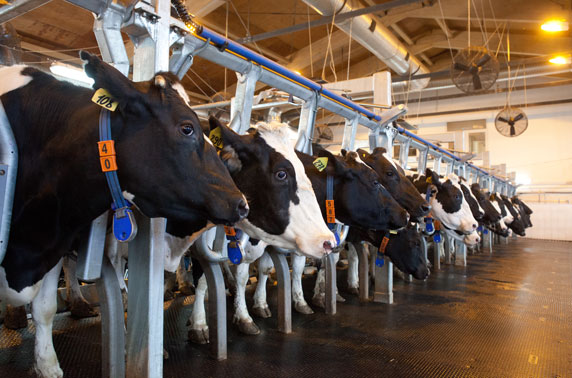- Web Desk
- Feb 24, 2026
Govt forms corporate-dominated council for promotion of dairy sector
-

- Web Desk Shahzad Paracha
- Dec 24, 2023

ISLAMABAD: The federal government has constituted a 19-member council consisting of big businesses and corporations for the promotion of the dairy sector.
Interestingly, the 19-member council, comprising major dairy corporations and big businesses in Pakistan, is devoid of any representation of dairy farmers who are already grappling with an existential crisis.
According to the Ministry of Commerce, “in pursuance of the Strategic Trade Policy Framework 2020-25, the MoC has been pleased to constitute the Council for Dairy and Dairy Products” to consist of 19 members, including representatives of the dairy sector.”
The Pakistan Dairy Association chief executive officer (CEO), the Agriculture and Dairy Farmers Association chairman, Nestle Pakistan Chairman Syed Yawar Ali, Engro Food CEO Ali Ahmed Khan, Haleeb Food’s Corporate Affairs head Farah Asim, Fuji Food CEO Usman Zaheer, Dairy Land Farms CEO Syed Sulaiman Saqid, Adam’s Milk Foods CEO Ajmal Caidary, Sharif Milk Products general manager, Shakarganj Food Products CEO Anjum Muhammad Saleem, Tahur Rashik CEO Elahi, Millac Foods CEO Farrukh Ikram, Sunway Lagoon Dairy Farm Dr Ahmad Shah, chairperson of the department of Dairy Technology at the University of Veterinary & Animal Sciences Lahore Dr Saima Inayat, Dean of the Institute of Animal & Dairy Science at the University of Agriculture Faisalabad Dr Muhammad Qamar Bilal, Livestock & Dairy Development Board chairman, Punjab Livestock and Dairy Development Board CEO, Director General (Agro Division) TDAP, and secretary commerce are the members of the council.
Karachi Dairy Farmers Association announces increase in milk price
According to the documents, the council will function in accordance with the terms of reference notified by the government.
The council shall provide input to the government on policy for the development and promotion of the dairy sector within the framework of STPK 2020-25, covering supply chain as well as marketing, trade facilitation, and market access issues.
The council may have representatives of the relevant federal ministries, provincial livestock and dairy development departments, relevant regulatory, standard-setting, and quality assurance departments, and any other relevant organizations on a case-to-case basis as per its requirement for advice and technical input.
The MoC will notify the chairman of the council, and TDAP headquarters/regional offices will be the secretariat of the council.
The sectoral councils shall hold at least four meetings in a year, and the activities of the council will be financed through the Export Development Fund (EDF).
The document stated that the government would also appoint a secretary of each sectoral council for three years on a lump-sum pay package.
The dairy sector is the biggest contributor to the agriculture value chain and a major player (11% of GDP) of the national economy.
Pakistan Dairy Association CEO Shahzad Amin welcomed the council and said that Pakistan could increase the export of dairy products to $1 billion from $300 million.
Pakistan and China have also signed an MoU on the dairy sector, and such agreements as well as investment under SIFC shall bring technology to the sector, which will eventually benefit this sector.
An official at the commerce ministry, wishing anonymity, said that large dairy enterprises and businesses were exacerbating the situation by intensifying their dominance in the sector, wielding increased control over markets, policymaking, and resorting to deceptive marketing strategies, leaving smallholder dairy farmers with limited options, forcing them to either incur debt or face extinction.
Despite eighty per cent of Pakistan’s dairy production and distribution being managed by small backyard farms and local vendors, the public’s confidence in these sources is continually eroded by the nexus between these corporations and successive governments, he said.
Unsubstantiated claims of the milk’s safety pose a severe threat to the livelihoods of millions of farmers.




